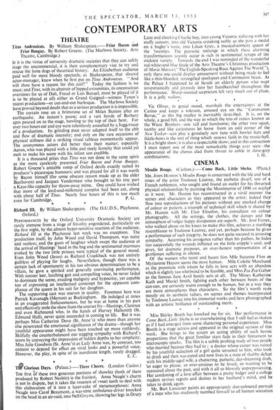CONTEMPORARY ARTS
THEATRE
Titus Andronicus. By William Shakespeare. Friar Bacon and IF it is the virtue of university dramatic societies that they can safely stage the uncommercial, it is their complementary vice to try and rescue the lame dogs of theatrical history. An Elizabethan audience paid well for mere bloody spectacle, as Shakespeare, that du ewd actor-manager, knew when he first put on Titus Andronieus. "And wilt thou have a reason for this coil?" Today the fashion is we must; and Titus, with its abattoir of lopped extremities, its unconscious overtones for us of Dali, Freud or Luis Bunuel, must be played (if it is to be played at all) either as Grand Guignol—witness Tynan's recent production—or out-and-out burlesque. The Marlowe Society have proved beyond doubt that as a serious production it is impossible.
The curtain rose on a brimstone set of Milan Station after an earthquake. An instant's pause; and a vast horde of Barbary apes poured on to the stage, howling to the top of their bent. For over two hours ear and eye were relentlessly assaulted by a Juggernaut of a production. Its grinding pace never adapted itself to the ebb and flow of dramatic intensity; and only on the rare occasions of physical stillness did a striking visual tableau momentarily appear. The anonymous actors did better than their matter; especially Aaron, who was played with a lithe and steely ferocity that could yet melt to make his scene with his infant son credible.
It is a thousand pities that Titus was not done in the same spirit as the more carelessly presented Friar Bacon and Friar Bungay. Robert Greene's amiable romp of Oxford devils exactly suited its producer's picaresque humours; arid was played for all it was worth by Bacon himself (for some obscure reason made up as the elder Beethoven) and Jacques Vandermast who brought to his tiny part a Kaye-like capacity for throw-away mime. One could have wished that more of the lord-and-milkmaid complot had been cut, along with about half of Titus. Nearly four hours of this is too much even for Cambridge. P. G.


































 Previous page
Previous page